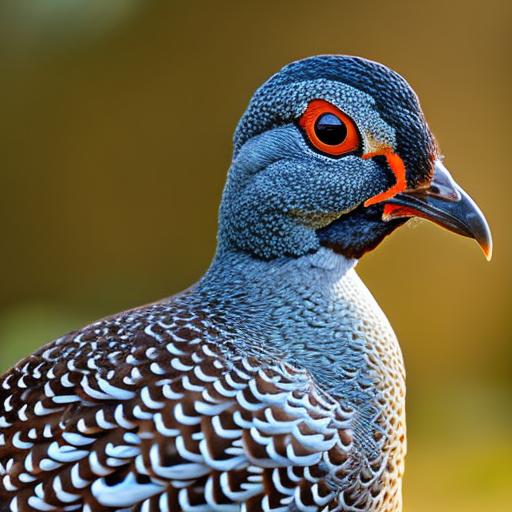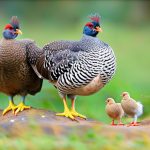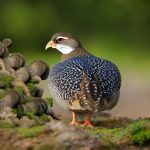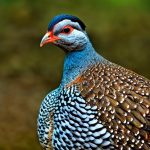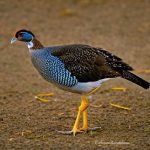Guinea fowl, also known as pintades, are a type of game bird native to Africa. They are popular for their unique appearance and their ability to control pests in the garden. Guinea fowl are known for their distinctive call, which can be quite loud and can serve as a natural alarm system. They are also valued for their delicious, lean meat and their ability to lay eggs with rich, flavorful yolks. Guinea fowl are social birds that thrive in flocks, and they are known for their strong flock instincts. They are hardy birds that can adapt to a variety of climates and are relatively low-maintenance compared to other poultry species. Guinea fowl are also excellent foragers and can help control insect populations in the garden, making them a valuable addition to any homestead or farm.
Guinea fowl come in a variety of colors, including pearl, lavender, and white, and they have distinctive feather patterns that make them stand out from other poultry species. They are known for their striking appearance, with a helmet-like crest on their heads and a spotted or striped plumage. Guinea fowl are also known for their strong flying ability, which allows them to roost in trees and escape from predators. They are active birds that enjoy exploring their surroundings and can be quite vocal, especially when they feel threatened or when they are communicating with other members of their flock. Overall, guinea fowl are fascinating and unique birds that can make a valuable addition to any poultry flock.
Key Takeaways
- Guinea fowl are hardy, low-maintenance birds that are great for pest control and as a source of meat and eggs.
- Creating the right environment for guinea fowl involves providing a secure coop, ample space to roam, and protection from the elements.
- Feeding guinea fowl a balanced diet of commercial feed, grains, and access to insects and greens is essential for their health and productivity.
- Preventing common diseases and parasites through proper hygiene, vaccination, and regular health checks is crucial for guinea fowl.
- Breeding and reproduction of guinea fowl requires a suitable nesting area, proper mating ratio, and careful monitoring of brooding and hatching.
Creating the Right Environment for Guinea Fowl
Creating the right environment for guinea fowl is essential for their health and well-being. Guinea fowl thrive in spacious, open areas where they can roam and forage for insects and seeds. They also require shelter to protect them from the elements and predators. A secure coop or shelter is essential for keeping guinea fowl safe at night and during inclement weather. The coop should be well-ventilated and provide enough space for the birds to roost comfortably. It should also be predator-proof, with sturdy walls and a secure door to keep out predators such as foxes, raccoons, and birds of prey.
In addition to a secure coop, guinea fowl also need access to a large outdoor area where they can roam and forage. A fenced-in yard or pasture is ideal for keeping guinea fowl safe while allowing them to explore and exercise. Guinea fowl are excellent foragers and enjoy hunting for insects, seeds, and small plants, so providing them with access to a natural environment is important for their physical and mental well-being. It’s also important to provide plenty of shade and fresh water for guinea fowl, especially during hot weather. Overall, creating the right environment for guinea fowl involves providing them with a secure shelter, access to outdoor space, and the opportunity to engage in natural behaviors such as foraging and roosting.
Feeding and Nutrition for Guinea Fowl
Feeding and nutrition are important aspects of caring for guinea fowl. Guinea fowl are omnivores and have a varied diet that includes insects, seeds, grains, and greens. In the wild, guinea fowl forage for insects such as grasshoppers, crickets, and beetles, as well as seeds and small plants. In a domestic setting, guinea fowl can be fed a commercial poultry feed that is specifically formulated for game birds. This feed should contain a balance of protein, vitamins, and minerals to support the health and growth of guinea fowl.
In addition to commercial feed, guinea fowl can also benefit from supplemental treats such as mealworms, fruits, and vegetables. These treats can provide additional nutrients and enrichment for guinea fowl, as well as help to keep them engaged and stimulated. It’s important to provide fresh water at all times for guinea fowl, especially during hot weather when they may need extra hydration. Overall, providing a balanced diet that meets the nutritional needs of guinea fowl is essential for keeping them healthy and thriving.
Health and Disease Prevention for Guinea Fowl
Maintaining the health of guinea fowl is essential for their well-being and productivity. Like all poultry species, guinea fowl are susceptible to a variety of diseases and health issues that can impact their overall health and longevity. It’s important to monitor the health of guinea fowl regularly and be proactive about disease prevention. This includes providing a clean living environment, regular access to fresh water, and a balanced diet that meets their nutritional needs.
In addition to good husbandry practices, it’s important to be aware of common diseases that can affect guinea fowl, such as respiratory infections, parasites, and nutritional deficiencies. Regular veterinary check-ups can help identify any health issues early on and ensure that guinea fowl receive prompt treatment if needed. It’s also important to quarantine new birds before introducing them to an existing flock to prevent the spread of disease. By being proactive about disease prevention and providing proper care and nutrition, it’s possible to keep guinea fowl healthy and thriving.
Breeding and Reproduction of Guinea Fowl
Breeding guinea fowl can be a rewarding experience for poultry enthusiasts. Guinea fowl are seasonal breeders that typically begin laying eggs in the spring and continue through the summer months. They are known for their strong brooding instincts and will often sit on a clutch of eggs until they hatch. Guinea fowl eggs have a distinctive appearance with speckled or spotted shells and are prized for their rich flavor.
To encourage breeding and reproduction in guinea fowl, it’s important to provide them with a suitable nesting area where they can lay and incubate their eggs. This can be a simple nesting box filled with straw or shavings, or a secluded area in the coop where they feel safe and secure. It’s also important to provide a balanced diet that meets the nutritional needs of breeding guinea fowl, as well as access to fresh water at all times.
Once the eggs hatch, it’s important to provide a warm, safe environment for the keets (baby guinea fowl) to grow and develop. This may involve using a brooder lamp or heat source to keep them warm, as well as providing them with access to chick starter feed that is specifically formulated for young poultry. By providing the right conditions for breeding and reproduction, it’s possible to raise healthy guinea fowl that will contribute to the overall flock.
Predator Protection for Guinea Fowl
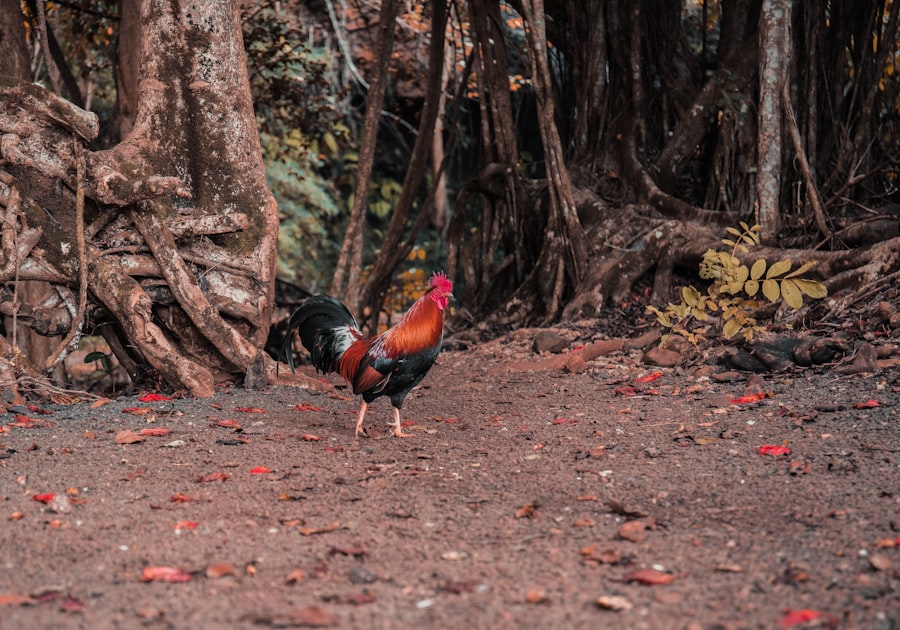
Protecting guinea fowl from predators is essential for their safety and well-being. Guinea fowl are vulnerable to predators such as foxes, raccoons, dogs, cats, and birds of prey that may try to attack them while they are roosting or foraging. It’s important to take proactive measures to protect guinea fowl from predators by providing a secure coop or shelter where they can roost at night and during inclement weather.
In addition to a secure coop, it’s important to provide a fenced-in yard or pasture where guinea fowl can roam during the day while being protected from predators. The fence should be sturdy and tall enough to prevent predators from climbing or jumping over it. It’s also important to regularly inspect the perimeter of the enclosure for any signs of damage or potential entry points for predators.
Other measures that can help protect guinea fowl from predators include using motion-activated lights or sound devices to deter nocturnal predators, as well as keeping guard animals such as dogs or geese that can help alert the flock to potential threats. By being proactive about predator protection, it’s possible to keep guinea fowl safe while allowing them to roam and forage in a natural environment.
Tips for Training and Handling Guinea Fowl
Training and handling guinea fowl can help make them more manageable and easier to care for. Guinea fowl are known for their strong flock instincts and can be skittish around humans, especially if they are not accustomed to being handled. However, with patience and positive reinforcement, it’s possible to train guinea fowl to be more comfortable around humans and easier to handle.
One tip for training guinea fowl is to spend time with them regularly so they become accustomed to your presence. This can involve sitting near their enclosure or spending time in the yard where they can see you without feeling threatened. Offering treats such as mealworms or grains can also help build trust with guinea fowl and make them more receptive to handling.
When handling guinea fowl, it’s important to approach them calmly and gently to avoid startling them. It’s also helpful to use slow movements and speak softly to reassure them while being handled. By taking the time to train and handle guinea fowl in a positive manner, it’s possible to build a trusting relationship with them that will make caring for them easier in the long run.
In conclusion, guinea fowl are fascinating birds that can make a valuable addition to any poultry flock. By creating the right environment, providing proper nutrition, maintaining their health, encouraging breeding and reproduction, protecting them from predators, and training them in a positive manner, it’s possible to care for guinea fowl successfully while enjoying their unique characteristics and contributions to the homestead or farm.
If you’re looking for tips on how to keep guinea fowl, you might also be interested in learning about the importance of proper ventilation in a chicken coop. Check out this article on chicken coop ventilation to ensure your poultry housing is well-equipped for the health and comfort of your birds.
FAQs
What are guinea fowl?
Guinea fowl are a type of bird native to Africa. They are known for their distinctive spotted feathers and loud, distinctive call.
What do guinea fowl eat?
Guinea fowl are omnivores and eat a variety of foods including insects, seeds, and small fruits. They are also known to forage for food on the ground.
How do you keep guinea fowl?
To keep guinea fowl, you will need a secure coop or shelter to protect them from predators. They also require access to a large outdoor area for foraging and exercise.
Do guinea fowl need special care?
Guinea fowl are relatively low-maintenance birds, but they do require access to fresh water, a balanced diet, and protection from predators.
Are guinea fowl noisy?
Yes, guinea fowl are known for their loud, distinctive call. They can be noisy, especially when they feel threatened or are trying to communicate with each other.
Meet Walter, the feathered-friend fanatic of Florida! Nestled in the sunshine state, Walter struts through life with his feathered companions, clucking his way to happiness. With a coop that’s fancier than a five-star hotel, he’s the Don Juan of the chicken world. When he’s not teaching his hens to do the cha-cha, you’ll find him in a heated debate with his prized rooster, Sir Clucks-a-Lot. Walter’s poultry passion is no yolk; he’s the sunny-side-up guy you never knew you needed in your flock of friends!

